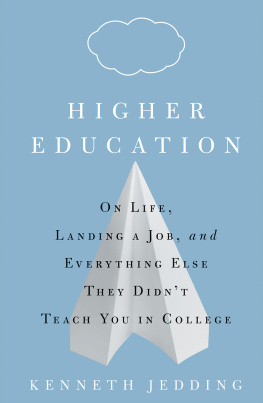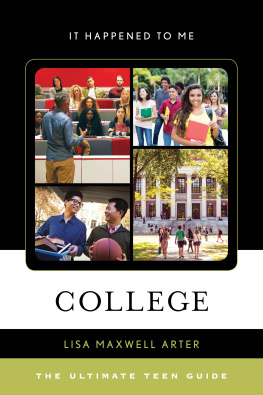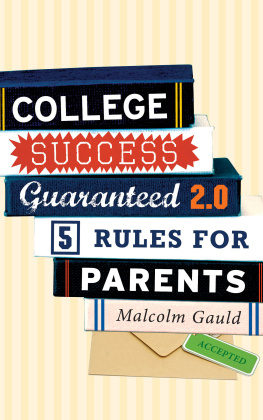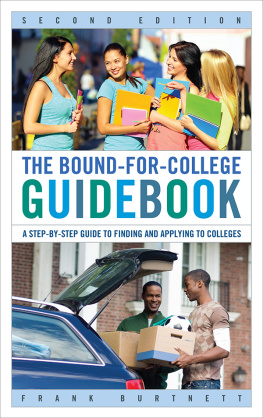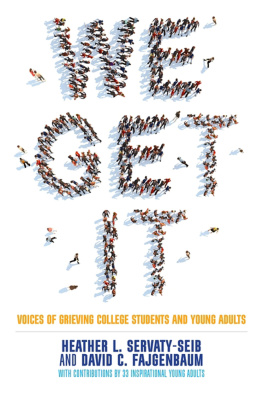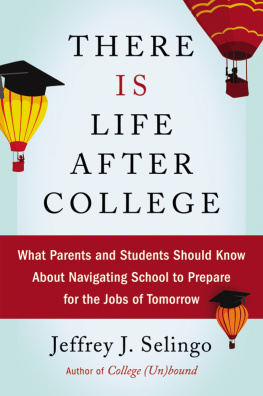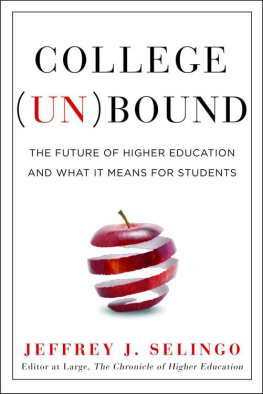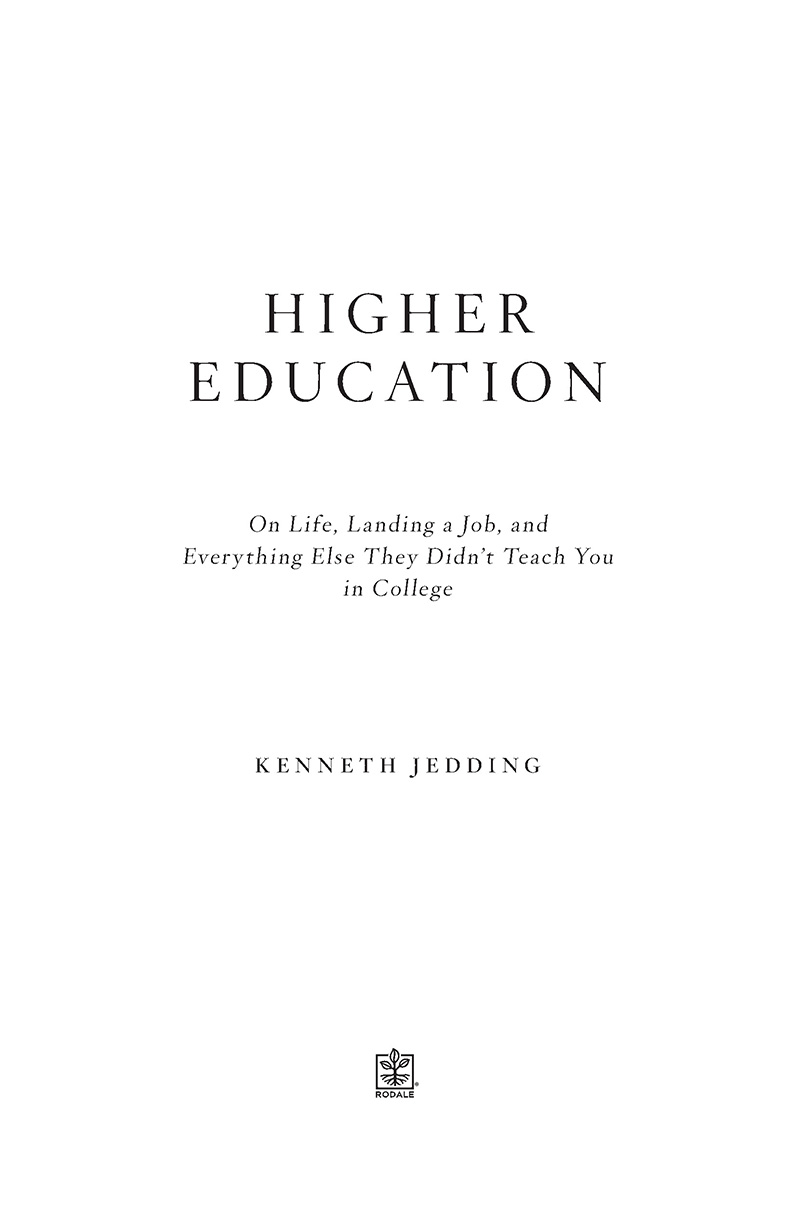To Bette
Table of Contents
INTRODUCTION
Y EARS AGO, WHEN I GRADUATED from college, I went into a local bookstore and asked the person behind the cash register where I could find The Book .
What I meant was the book that would tell me all the things I didnt learn in school: how to get a job, how to navigate friendship and love, how to maintain a good relationship with my family, and, above all, how to stay cool.
I wanted to know whether Id majored in the wrong thing.
I wanted to know how to get started, even if I didnt know what it was I wanted to do.
I wanted to know how to track down my passion.
And how I should go about pursuing that passion once I knew what it was.
I wanted to know how to deal with relationships: new ones, old ones, breakups, and how to ready myself for The One.
I wanted to know how to be with my parents.
And I wanted to know how to stay sane through the whole process.
In other words: I wanted to know a lot . And jumping into the great sea that is Life-after-College, with all its crosscurrents and crashing waves and changing tides, without any of this information, seemed a very dangerous leap. Which was why I went in search of a kind of life preserver: nothing epic, nothing too seriousjust some guidance I could carry around with me, ideally in one hand.
Unfortunately, I was told no such book existed.
So I had to answer all those questions for myself.

Needless to say, I wasnt equipped to write my own version of The Book for many years. But when I had done my best to answer all my own questions, I set about writing a version of what you hold in your hands: the book I believe every new college graduate should have the benefit of reading. It contains not just the wisdom Ive gained over my own time spent in the real world, but also the collective wisdom of many of my favorite people, friends and role models alikeall of whom have something to offer of enormous value to anyone just starting outwhether thats you, the graduate in your life, or indeed any curious reader in pursuit of a little advice.
So here you are: Higher Education . I hope it helps youand those you share it withachieve everything you desire
And more.
P ART 1

CAREERS
C HAPTER

YOU MAJORED IN THE RIGHT THING
Map out your future, but do it in pencil.
J ON B ON J OVI
I THINK I MAJORED IN the wrong thing!
There arent any jobs open for people with my major .
I majored in one subject, but now I want to do something else .
Does this sound like you?
Heres the thing: It sounds like a lot of people just out of college. But your major doesnt matter nearly as much as you probably think it does. It certainly doesnt matter as much to your prospective employers as it does to you. Of course, if you want to be a doctor but werent premed, or if you want to be an engineer but never took an advanced math course, youll have to go back and learn the fundamentals. But for most people, their college major is only the beginning of the story.
The very beginning. The Once upon a time part of your life.
Or at least it will be, soon enough. Trust me. What you majored in certainly says something about who you are and what interests you, but it isnt going to make or break your career. Youre not stuck there.
The keys to your job prospects are your character, work ethic, and potentialin other words, your ability to give a prospective employer a reason to hire you. Thats what employers are looking for, and thats what Im going to talk about here.
I know what you may be thinking: Yeah , right .
Dont worry. Well get there. Well cover all the bases. For now, the important thing to digest is just this:
You majored in the right thing.
Really.
You did.

Still need convincing?
Lets say you majored in French, but you dont want to be a language instructor, translator, professor, or interpreter at the United Nations. Youve thought about it quite a bit, and what you really think you would enjoy is being an advertising copywriter. Not only that, but youve just come across an online job posting for an assistant copywriting position at an ad agency. But you researched it and found out they dont do ads in French. So now youre thinking, Why would they hire someone who studied French?
And while youre giving yourself a hard time for having wasted 4 years, the window of opportunity closes because the ad agency hires someone with a degree in Spanish.
Why?
Because the Spanish studies grad showed up and made a successful case for herself.
And how did she do that?
Well, she said that even though she doesnt have any actual copywriting experience, shes eager to learn and willing to work hard.
So far, so good.
But what about the Moment of Truth?
What happened when the interviewer said, But you majored in Spanish. This job is in copywriting. Our works primarily in English.
What did she say?
I majored in Spanish because I love Mrquez and Allende, because I wanted to learn a new language, and because my favorite freshman seminar was 20th-Century South American Fiction and Political Change.
Wow!
Wait what?
Basically, she added, I love words, I love language, and I love how people use language to persuade mass audiences.
And this, if you think about it, is exactly what an ad exec looking for an assistant copywriter wants to hear.
But hold on! you may be thinking now. I dont speak a foreign language. I dont know anything about 20th-century South American fiction. Who is Mrquez? Who is Allende? I didnt have a favorite freshman seminar. As a matter of fact, as a freshman I was just focused on having a good time, getting to class in one piece, and not embarrassing myself .
It doesnt matter. The point is this: No matter how unrelated your major may seem to you, you should be proud of what you chose to study for 4 years, and you should find ways to make it relevant to your story .
Yes, even your major.
Keep reading.

Part of the reason your major was right is that your choice of a major is an honest part of who you are, and thats exactly what a prospective employer wants to learn more about: you .
Virtually every person Ive ever met in charge of entry-level hiring (and I have known many such people, across many different industries) insists thatassuming your rsum does not contain any blatant typosthe real deciding factors lie beyond the mere piece of paper.
They lie within you.
Think of it this way: A job interview is like a first date. Both you and your interviewer should be trying to figure out whether you want to spend a lot more timeprobably all day, 5 days a weekin each others company.
If you feel bad about your major, or you cant think of a single reason why it can be seen as relevant to the jobor if youve already decided that French is bound to be nothing more than a hobby down the roadyou lose an opportunity to give the interviewer what he or she wants: some insight into how confident you are, what inspires you, and how you make decisions.

